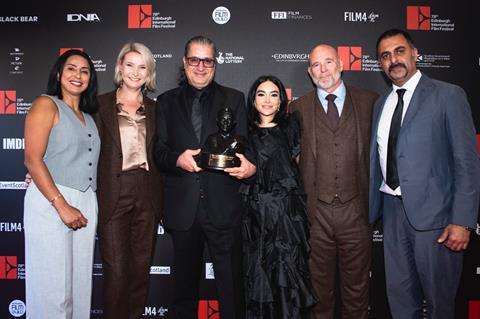The second edition of the Edinburgh International Film Festival under the aegis of festival director and CEO Paul Ridd and producer Emma Boa clos
The second edition of the Edinburgh International Film Festival under the aegis of festival director and CEO Paul Ridd and producer Emma Boa closed this week, with attendees welcoming a decent selection of world premieres and improved screening venues, including the return of the Edinburgh Filmhouse.
Abdolreza Kahani’s Canada-set Mortician won the main £50,000 Sean Connery Prize for feature filmmaking excellence, and further competition titles generating interest on the ground included UK filmmaker Helen Walsh’s sophomore feature On The Sea and Elliot Tuttle’s camboy drama Blue Film.
The general feeling, as a source told Screen, was the competition line-up was ”decent enough without containing any great discoveries”.
The screening venues were a hit after some of last year’s more makeshift pop-up venues. ”I felt that having a central hub venue in Tollcross Central Hall was a major improvement on EIFF24, as was ensuring that the venues were fully accessible” said Jason Wood, BFI executive director of public programmes and audiences. ”It is such a handsome venue. It was also great to have the Filmhouse open and trading again. They have done a remarkable job on the renovations.”
The Vue Omni was also added as an official venue.
Further industry execs in attendance included Vue Lumiere’s Eve Gabereau, Picturehouse’s Claire Binns, Reclaim The Frame’s Melanie Iredale, Film4’s Farhana Bhula, David Kimbangi and Alice Whittemore, Glasgow Film’s outgoing chief executive Allison Gardner and incoming heads Seonaid Daly and Paul Gallagher, BBC Film’s Eva Yates and Claudia Yusef and BFI Filmmaking Fund’s Mia Bays.
The festival’s resilient commitment to nurturing early career filmmakers was evident, with former Film Constellation marketing director Chloe Tai brought on board as a consultant to work with the emerging filmmakers competing for the Sean Connery prize and helping to formulate personalised release strategies, and industry networking events were well attended. Several attendees commended the festival for how well these filmmakers were looked after.
Challenges
Ridd made clear his ambition to cultivate EIFF as a hub of market activity, telling Screen ahead of the festival: “Building a market is very important to us, and luring buyers and international distributors to Edinburgh to experience what we’re all about.”
But attracting sales agents and distributors from London and further afield during the summer holidays, and at the same as many travel to the Sarajevo and Locarno film festivals, will require careful thought.
With so much going on in Edinburgh in August, including the Fringe festival (which boasts around 4,000 shows in itself), book festival, Edinburgh International Festival and slight crossover with the TV festival, keeping audiences engaged with EIFF also remains a challenge, particularly for some of the public-facing ‘in conversation’ events.
Some Scotland-based film professionals also expressed their wish to see more locals represented on the programming teams and moderating events.
Light grumbles on social media included about screenings of Bond 4K restorations not being the versions advertised (EIFF told Screen no one asked for a refund), plus a controversial quiz night, in which some film buffs suggested London-based critic Ali Plumb had re-run questions from a quiz he had toured in 2024.
On the industry side, all press were shut out of attending the festival’s industry programme which was created as a collaboration with Amy Jackson and Lauren Dark’s Edinburgh-based production company Unified and included speakers such as A24’s Rose Garnett, BBC Film director Yates and Film4 interim director Bhula. The talks are understood to have been well attended, with good take-up from emerging filmmakers.
Screen understands the no-press policy may be reviewed for next year.
Ultimately, EIFF in its current form is still a festival in its infancy (albeit one with a 78-year history). Experimentation and teething problems are par for the course of a burgeoning festival. Official attendance figures are set to be unveiled in the coming days. How EIFF marks itself out going forward within the Scottish, UK and international festival landscapes, the local and wider industries are eager to see.

COMMENTS